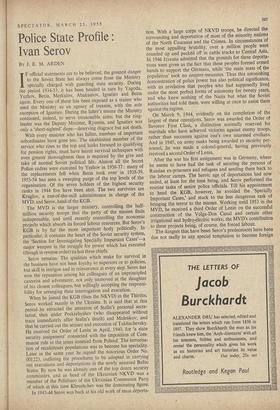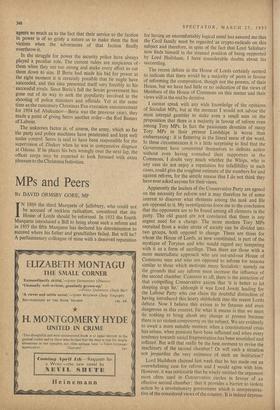Police State Profile : Ivan Serov
BY J. E. M. ARDEN official statements are to be believed, the greatest danger the Soviet State has always come from the Ministry specially charged with guarding state security. During the period 1934-53, it has been headed in turn by Yagoda, Yezhov, Beria, Merkulov, Abakumov, Ignatiev and Beria again. Every one of these has been exposed as a traitor who used the Ministry as an agency of treason, with the sole exception of Ignatiev. During the latter's tenure the Ministry continued, indeed, to serve treasonable aims; but the ring- leader was the Deputy Minister, Ryumin, and Ignatiev was only a 'short-sighted' dupe—deserving disgrace but not death. With every minister who has fallen, numbers of important subordinates have gone too. The established member of the service who rises to the top and looks forward to qualifying for pension rights, must have learnt survival techniques with even greater thoroughness than is required by the give and take of normal Soviet political life. Almost all the Secret Police cadres were executed by Yezhov in 1936-37: many of the replacements fell when Beria took over in 1938-39. 1953-54 has seen a sweeping purge of the top levels of the organisation. Of the seven holders of the highest security ranks in 1944 five have been shot. The two survivors are Kruglov, a run-of-the-mill administrator in charge of the MVD; and Serov, head of the KGB.
The MVD is the larger ministry, controlling the half- million security troops that the party of the masses finds indispensable, and until recently controlling the economic projeas which absorb its forced labour resources. But Serov's KGB is by far the more important body politically. In particular, it contains the heart of the Soviet security system, the 'Section for Investigating Specially Important Cases'—a major weapon in the struggle for power which has executed (though in reverse order) its last three chiefs.
Serov remains. The qualities which make for survival in the business have not been loyalty to superiors or to policies, but skill in intrigue and in reinsurance at every step. Serov has won the reputation among his colleagues of an unprincipled careerist and adventurer, not only unmoved at the slaughter of his closest colleagues, but willingly accepting the responsi- bility for arranging their interrogation and execution.
When he joined the KGB (then the NKVD) in the Thirties, Serov worked mainly in the Ukraine. It is said that at this period.he attracted the attention of Stalin's personal secre- tariat, then under Poskrebyshev (who disappeared without trace immediately after Stalin's death) and Malenkov; and that he carried out the seizure and execution of Tukhachevsky. He received the Order of Lenin in April, 1940, for 'a state security assignment' connected with the imposition of Com- munist rule in the areas annexed from Poland. The .terrorisa- tion of recalcitrant populations was to become his speciality. Later in the same year he ,signed the notorious Order No. 001223, outlining the procedures to be adopted in carrying out executions and deportations in the newly annexed Baltic States. By now he was already one of the top dozen security commissars. and as head of the Ukrainian NKVD was a member of the Politburo of the Ukrainian Communist Party of which at this time Khrushchev was the dominating figure.
In 1943-44 Serov was back at his old work of mass deporta- tion. With a large corps of NKVD troops, he directed the surrounding and deportation of most of the minority nations of the North Caucasus and the Crimea. In circumstances of the most appalling brutality, over a million people were rounded up and packed off in cattle trucks to Central Asia. In 1946 lzvestia admitted that the grounds for these deporta- tions were given as the fact that these peoples formed armed bands to support the Germans, while 'the main mass of the population' took no counter-measures. Thus this astonishing demonstration of police power has also political significance, with its revelation that peoples who had supposedly lived under the most perfect forms of autonomy for twenty years, and who knew nothing of the Nazis but what the Soviet authorities had told them, were willing at once to assist them against the regime.
On March 9, 1944, evidently on the completion of the largest of these operations, Serov was awarded the Order of Suvorov First Class, a distinction normally reserved for marshals who have achieved victories against enemy troops, rather than successes against one's own unarmed civilians. And in 1945, on army ranks being awarded to security per- sonnel, he was made a colonel-general, having previously received a second Order of Lenin.
After the war his first assignment was in Germany, where he seems to have had the task of securing the persons of Russian ex-prisoners and refugees and sending them back to the labour camps. The heroic age of deportations had now ended, at least for the time being, and Serov performed the routine tasks of senior police officials. Till his appointment to head the KGB, however, he avoided the 'Specially Important Cases,' and stuck to the less dangerous task of bringing the terror to the masses. Working until 1953 in the MVD, he received a third Order of Lenin on the successful construction of the Volga-Don Canal and certain other irrigational and hydro-electric works; the MVD's contribution to these projects being, of course, the forced labour.
The dangers that have beset Serov's predecessors have been due not really to any special temptation to become foreign agents so much as to the fact that their service to the faction in power is of so grisly a nature as to make them the first victims when the adversaries of that faction finally overthrow it.
In the struggle for power the security police have always played a peculiar role. The current rulers are suspicious of them when they are too strong and make every effort to cut them down to size. If Beria had made his bid for power at the right moment it is certainly possible that he might have succeeded, and this idea presented itself very forcibly to his successful rivals. Since Beria's fall the Soviet government has gone out of its way to seek the popularity involved in the shooting of police ministers and officials. Yet at the same time as the customary Christmas Eve execution announcement for 1954 (of Abakumov—Beria was the previous year). they made a point of giving Serov another order—the Red Banner of Labour.
The unknoWn factor is, of course, the army, which so far the party and police machines have penetrated and kept well under control. Serov is said to have been responsible for the supervision of Zhukov when he was in comparative disgrace at Odessa. If he places his bets wrongly over the next lap, the officer corps may be expected to look forward with extra pleasure to the Christmas festivities.



































 Previous page
Previous page